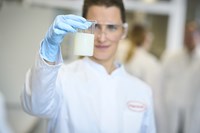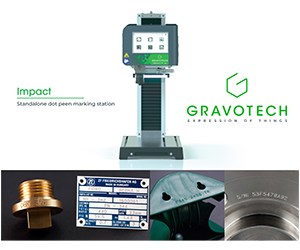Eliminating Unnecessary Manufacturing Steps Just One Part Of Good Partnering
This shop is very serious about cutting inefficiencies from it's processes, and that includes picking a supplier who is focused on the same issues of eliminating waste and adding value.
"Striving to become world class," Darryl Miller says, "takes hard work, a committed work force and management, a flat organization, open and honest communication, the best equipment and tools—and a close relationship with critical suppliers." One such supplier Mr. Miller talks candidly about is precision transfer machine builder, Hydromat Inc., of St. Louis, Missouri.
Mr. Miller, of Aeroquip Corporation in New Haven, Indiana, describes his major job as "getting waste out of the value stream." What that means, he says, is looking at every step in the operation—from the producers of raw materials and equipment suppliers, to all the steps that take place in the plant to produce product, to shipping, to gaging customer satisfaction." "Every step," he says," has to be turned inside out and upside down. There can be no assumptions. If it's not adding value, it's adding waste. And you'd be surprised where you find waste—especially if you turn more than 500 people in teams loose on the plant floor and ask them for their ideas."
After reading material and listening to experts on lean manufacturing and removing waste from the value chain, Aeroquip began implementation of those principles.
Hydromat (St. Louis, Missouri) fits Mr. Miller's criteria for the role of a supplier/partner. "When you blur the lines between the two companies," he says, "and don't know where one starts and the other stops, and you really can't discern who works for whom because you're both focused on the same issues, eliminating waste and adding value, then that's as good as it gets in supplier relationships." Mr. Miller says Hydromat fits this criteria.
Mr. Miller describes Hydromat as an "innovative" supplier that works with New Haven engineers to develop machines that fit Aeroquip's processes. Hydromat is very good at listening to the needs of the customer and then designing a machine around those needs.
Mr. Miller goes on to remark that too many suppliers develop product in a vacuum and then bring it to the customer as a solution. He points out that with many of Aeroquip's suppliers, New Haven uses a score card approach. "We score these suppliers on defective parts per million (DPPM) and late parts per million (LPPM). And the suppliers have to reach a certain level to achieve Certified Supplier status, and then they have to maintain and improve on that level of performance."
Any plant manager will report it is "results" that matter: quality, uptime, flexibility, reliability and on-time delivery.
Many of New Haven's brass components are machined on Hydromats. They are primarily for residential, commercial and industrial air conditioning and refrigeration systems, as well as components for high-pressure hydraulic applications. Machine uptime is 90 percent-plus.
Mr. Miller suggests rotary transfer machine technology has been part of reductions in machining scrap as well as adding to an increase in work-in-process (WIP) inventory turns per year and a drop in WIP inventory. Further, rotary transfer machines result in a lower cost of operation and maintenance. "The screw machines we used to use were designed to run on oil," Mr. Miller says, "and we were running them on a more environmentally responsible water-based lubricant. The result was unacceptable downtime and maintenance. The Hydromats are designed to run on water-based lubricants, which just adds to their reliability as production machinery. We run their hearts out, three shifts around the clock, very often seven days a week. When you're dealing with millions of parts per machine annually, the machines have to be dependable and reliable."
Elimination of operational steps is another benefit of the Hydromat approach. "Take valves," Mr. Miller says. "Before, the production of many styles required multi-step processes, involving three or four separate operations. Now, thanks to process improvements, several steps have been reduced and operations and setup times have improved. You can see the impact this has on productivity and the potential elimination of waste."
Mr. Miller cautions that these process improvements don't just happen. Hydromat, he says, does more than just provide a reliable, quality machine. "They give us a `best-solution' approach to several of the parts we've had them look at," Mr. Miller explains. "Over the years, Hydromat engineers have come on site and contributed manufacturing insights and potential process improvements.
"Note that this is after initial machine installation. This is what good partnering is all about. This is where the lines between companies blur and real partnering begins. You both focus on the same thing: eliminating waste and creating value."
For more information, visit the Hydromat Showroom.
Read Next
The Cut Scene: The Finer Details of Large-Format Machining
Small details and features can have an outsized impact on large parts, such as Barbco’s collapsible utility drill head.
Read More3 Mistakes That Cause CNC Programs to Fail
Despite enhancements to manufacturing technology, there are still issues today that can cause programs to fail. These failures can cause lost time, scrapped parts, damaged machines and even injured operators.
Read More







.png;maxWidth=300;quality=90)











